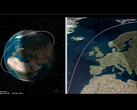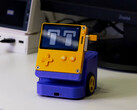Genesis was created by a consortium of 19 universities and companies, including renowned institutions such as MIT, Imperial College London, Peking University and technology companies such as Nvidia and the MIT-IBM Watson AI Lab. The simulator enables robots to train in virtual environments and achieve learning speeds that would be unattainable in the real world. According to the developers, robots in Genesis learn up to 430,000 times faster than via conventional methods.
This enormous acceleration is made possible by several innovative functions. One of these is the ability to create 3D environments using AI and text prompts. Researchers and developers can thus generate complex scenarios, such as factory halls, apartments or urban environments, quickly and easily by giving the system text-based instructions. Genesis' underlying physics engine has been developed from scratch and is capable of simulating a wide range of materials and physical phenomena, ranging from the collision of objects to the interaction of liquids and gases.
Another advantage of Genesis is the high speed that can be achieved without the need for supercomputers. On a standard Nvidia GeForce RTX 4090 graphics card, up to 43 million frames per second (FPS) are possible in certain simulations. This is made possible by a combination of efficient code and the simulator's cross-platform compatibility. The physics simulator works with Nvidia and AMD graphics cards, conventional CPUs and Apple's Metal, making it accessible for a wide range of users. One hour of calculation time in the simulator is equivalent to up to ten years of training in the real world, which can drastically shorten the development cycles of robots.
The project is open source and has been published under the Apache License, Version 2.0. This gives developers great freedom in using and modifying the code. The source code and further information are available on GitHub.
Genesis has a wide range of applications. In industry, the simulator could be used to optimize production lines and robot movements, including tasks such as welding, painting or assembly. In the development of household robots, Genesis enables the testing of navigation algorithms in virtual homes and the simulation of interactions with objects and people. In research and development, Genesis can be used to investigate new robot designs, new steering methods and to conduct experiments in safe virtual environments. Genesis also offers potential in the field of disaster control, such as training robots for use in hazardous environments, one example of which is searching for buried victims.
Impressive results of the simulations can be seen on the project page. Videos there show a four-legged robot that has, with the help of Genesis, learned to crawl, run at a gallop, hop on two legs and even do a backflip. The neural network that controls the robot was likely trained in just a few hours. The RoboGen tool, which runs in Genesis, was used for this.
Genesis may also be interesting for the film industry and game developers. The simulator can easily create animations of liquids and gases that would otherwise be difficult to program. Genesis can also simulate complex motion sequences in the area of character design, making character animations look more realistic.















